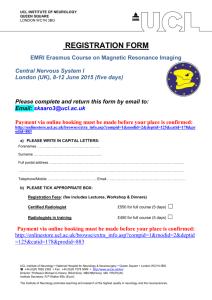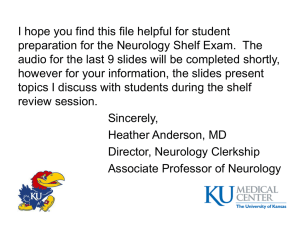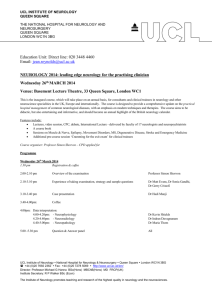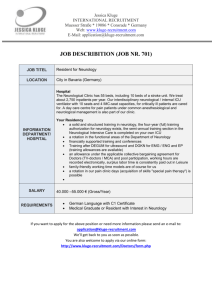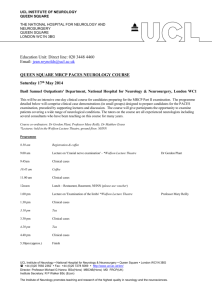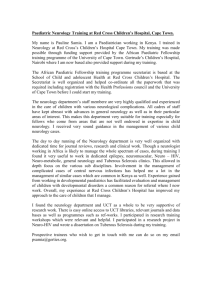CLINICAL NEUROLOGY MSc / 2016/17 ENTRY www.ucl.ac.uk/graduate/neurology
advertisement
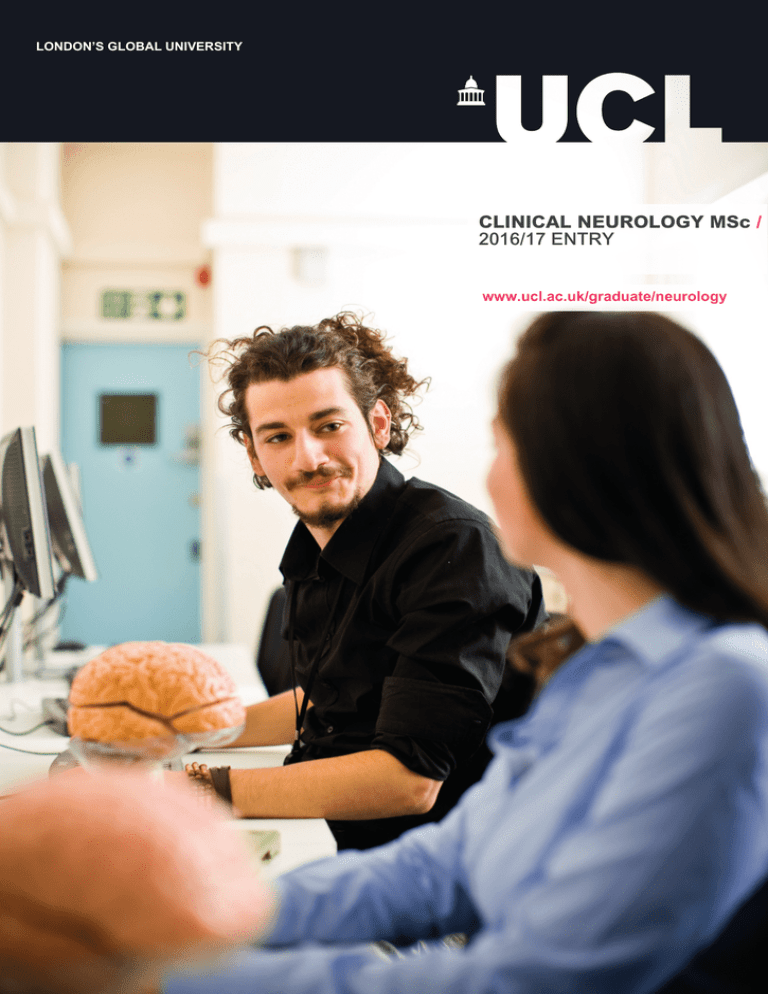
LONDON’S GLOBAL UNIVERSITY CLINICAL NEUROLOGY MSc / 2016/17 ENTRY www.ucl.ac.uk/graduate/neurology Clinical Neurology MSc / Students will study at the world-renowned Queen Square, and will be taught by internationally recognised experts in the field. Students have the opportunity to interact freely with our neurologists, and undertake a specialist attachment during the second six months of their programme. Degree summary Degree structure Mode: Full-time: 1 year Students undertake modules to the value of 180 credits. The programme consists of six core modules (120 credits) and a research project (60 credits). A Postgraduate Diploma (full-time six months is offered). CORE MODULES // Diseases of the Nervous System: Epilepsy, Pain, Tumours and Infection Students gain knowledge of the clinical features and scientific basis of the following neurological areas and disorders: nerve and muscle; epilepsy; pain; movement disorders and Parkinson's Disease; neuro-otology and neuro-ophthalmology; stroke; neuropsychiatry and cognition; infections of the nervous system; multiple sclerosis and neuroimmunology; autonomic function and neuro-urology; neuro-oncology and ITU neurology. // Peripheral Nerve, Muscle and Special Senses // Motor Systems and Disease // Higher Functions of the Brain // Practical Neurology // Theoretical Neurology // // // The mission of the UCL Institute of Neurology is to carry out high-quality research, teaching and training in basic and clinical neurosciences. Together with our associated hospital, the National Hospital for Neurology and Neurosurgery, we form the world-renowned Queen Square and promote the translation of research that is of direct clinical relevance to improved patient care and treatment. Students are given the opportunity to experience the full range of activities of a world-famous specialist hospital. The programme is delivered through lectures, seminars, clinical teaching (including outpatients, inpatients, workshops, training for history taking and clinical examination, demonstrations and conferences) and subspecialist training in a single neurological speciality. Assessment is through written examination, MCQ, short case clinical examination, viva voce, continuous assessment and the research dissertation. OPTIONS There are no optional modules for this programme. DISSERTATION/REPORT // All MSc students undertake an independent research project, which takes the form of a scientific investigation and culminates in a dissertation of 10,000 words. Your career This programme provides an excellent basis for a clinical or research career in clinical neurology and related disciplines. First destinations of recent graduates of the programme include: // // // // // // Neurological Centre am Rosenhügel: Neurology Resident Apollo Hospital: Consultant Neurologist Institute of Neurology, UCL: Research Fellow in Neurology CHC Hospital: STI Doctorate Institute of Medical Science: Doctor University Hospital Coventry and Warwick NHS Trust: Specialist Registrar Recent career destinations* include: // // // // University of Missouri, Neurology Residency, 2013 // The Royal Marsden Hospital, Sutton, Doctor, 2013 National Hospital for Neurology and Neurosurgery, Neurologist, 2013 International University of Africa, Consultant Neurologist, 2012 National Hospital for Neurology and Neurosurgery, Senior Home Officer, 2012 Employability For students starting out on their clinical careers the programme will give them skills and experience to move towards specialist training. For more established clinicians it is an opportunity to refresh and refine their clinical practice. All students benefit from exposure to the scientific underpinning of neurology, and the opportunity to undertake an original research project, and a specialist attachment, studying alongside the internationally renowned neurologists at Queen Square. * data taken from the ‘Destinations of Leavers from Higher Education’ survey undertaken by HESA looking at the destinations of UK and EU students in the 2010–2012 graduating cohorts six months after graduation and, where necessary, departmental records. Entry requirements A minimum of a second-class UK Bachelor's degree in an appropriate subject or an overseas qualification of an equivalent standard is required. Applicants must be medically qualified, hold registration with the UK General Medical Council (GMC), or be fully registered in their home country, and have at least two years of postgraduate experience in clinical medicine, at least six months of which is neurology. English language proficiency level If your education has not been conducted in the English language, you will be expected to demonstrate evidence of an adequate level of English proficiency. The level of English language proficiency for this programme is: Standard. Information about the evidence required, acceptable qualifications and test providers is provided at: www.ucl.ac.uk/graduate/english-requirements Your application The deadline for all applicants is 29 July 2016. Students are advised to apply as early as possible due to competition for places. Those applying for scholarship funding (particularly overseas applicants) should take note of application deadlines. When we assess your application we would like to learn: // why you want to study Clinical Neurology at the UCL Institute of Neurology // // what particularly attracts you to the programme // how this qualification might help you in your future clinical career, bearing in mind that this course is not a direct entry route into Neurology training in the UK in what way you think your academic and professional background might help you meet the demands of the programme Together with essential academic requirements, the personal statement is your opportunity to illustrate whether your reasons for applying to this programme match what the programme will deliver. Details on how to apply are available on the website at: www.ucl.ac.uk/graduate/apply PDF Updated: May 25, 2016 Information correct at time of going to press. See website (www.ucl.ac.uk/ion) for latest information FEES AND FUNDING // UK & EU (2016/17) entry: £12,840 (FT) // Overseas (2016/17) entry: £24,400 (FT) Full details of funding opportunities can be found on the UCL Scholarships website: www.ucl.ac.uk/scholarships APPLICATION DATE All applicants: 29 July 2016 CONTACT Email: ion.educationunit@ucl.ac.uk Telephone: +44 (0)20 3448 4740
